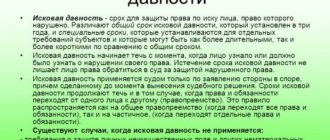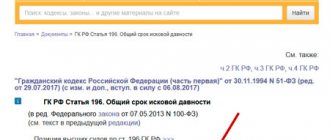By the concept of “limitation period,” the Russian legislator means the time period during which a person can protect his own violated interests or rights in a judicial or other government body. What statutes of limitations exist in family law will be described in detail below.
By the concept of “limitation period,” the Russian legislator means the time period during which a person can protect his own violated interests or rights in a judicial or other government body. What statutes of limitations exist in family law will be described in detail below.
What is the statute of limitations?
The statute of limitations is the period when an interested person can apply for protection of rights and interests to a court or other government body. The general period of ID is 3 years from the day the citizen learned about the violation of rights, but special periods may also apply (Article 196 of the Civil Code of the Russian Federation).
In family law, there is no concept of limitation of actions - there are deadlines for filing alimony for children, parents, spouses and relatives, and claiming penalties for them.
Valid reasons for absence
The recognition of a particular reason as valid is carried out by the court in accordance with its internal conviction at its own discretion on the basis of the evidence and explanations presented by the applicant to the court. In each individual case, the circumstances will be assessed taking into account specific conditions.
Judicial practice in this category of cases suggests that the most common reasons that courts subsequently recognize as valid are:
- unforeseen incidents, force majeure;
- long-term illnesses;
- death or serious condition of any loved one;
- long business trips, etc.
Legal illiteracy or ignorance of the law, as a general rule, is not a sufficient basis for restoring the procedural deadline.
If you are interested in the topic of collecting alimony through the court, then read our materials on how to write and submit a claim for alimony for a child and mother and a complaint about the inaction of bailiffs.
Is there a statute of limitations for collecting alimony?
According to Art.
80 of the RF IC, parents are obliged to provide for their common children until they reach adulthood. If one of them does not fulfill this obligation, the second seeks alimony through the court. They are assigned in a fixed amount of money, as a share of the salary or in a mixed form - it all depends on the presence or absence of official earnings from the payer and other circumstances. You can collect child support until the child reaches adulthood. If the child was previously disabled, and upon reaching adulthood he was assigned a Group 1 disability indefinitely, alimony is collected at any time for an indefinite period.
A mother caring for a disabled child can also claim payments from her ex-husband for herself.
It is possible to collect alimony debts when a non-disabled child comes of age only for the last 3 years.
Deadline for alimony payments by an accountant after salary
How to reduce the amount of alimony penalties?
Types of liability for non-payment of alimony
When a child reaches eighteen years of age, the same list of penalties as if the debt arose before the child came of age. These include:
- calling for an appointment with the bailiff and taking explanations about the reasons for the outstanding debt;
- announcement on the executive wanted list;
- a ban on the debtor leaving the Russian Federation if the debt exceeds 10,000 rubles;
- restriction of the use of a special right (blocking a driver’s license - deprivation of the right to drive a vehicle);
- foreclosure on the debtor's funds, including credit, as well as on property (property) belonging to him;
- application of administrative pressure on the defaulter in the form of compulsory work, fine or arrest.
All of the above measures are aimed at fulfilling the requirements of the law regarding the obligation to repay the alimony debt in full .
Limitation period for writ of execution
If alimony is collected through the court, the plaintiff receives a writ of execution based on the results of the court proceedings. It contains detailed information about the amount of payments and the debtor.
You can contact the FSSP from IL at any time. The document expires when the child for whom alimony is being collected turns 18 or when the debtor fulfills the requirements. IP can be presented within 3 years after registration by the court.
Bailiffs have deadlines specified in the Federal Law “On Enforcement Proceedings”:
- within 24 hours from the moment of registration of the application for the collection of alimony from IL, the bailiff must issue a resolution to initiate enforcement proceedings.
- no later than the day following the day the decision was made, the bailiff sends copies of it to the parties to the proceedings - the defendant and the collector.
The debtor is given 5 days to voluntarily pay the debt, after which an enforcement fee of 7% of the amount of the debt may be collected.
Everything is paid on the official website of the FSSP, after checking the information through the electronic database “Bank of Enforcement Proceedings”. All you need is the full name and date of birth of the debtor.
Limitation period for collecting arrears of alimony
According to Art. 107 of the RF IC, alimony can only be recovered for the past period for the last 3 years. Subject to the plaintiff providing evidence of his taking measures to receive money for the maintenance of a minor:
- audio and video recordings;
- correspondence with the payer;
- witness's testimonies.
Appeal to the court is allowed even after the child reaches 18 years of age, but the debt is collected only for 3 years preceding the date of filing the claim.
The legislative framework
How to determine the statute of limitations for collecting alimony, what laws should you rely on? The list of grounds for assigning alimony obligations and the procedure for calculating the statute of limitations are established by Chapters 13-17 of the RF IC; these norms contain:
- Peculiarities of notarized confirmation of the alimony payment agreement. In accordance with Article 100 of the RF IC, this document can be used as a writ of execution in the event of the need for forced collection of payments and the accrual of penalties.
- The deadlines for applying for payments in the presence of a court decision are determined by Art. 107 RF IC.
- The need for indexation of payments and the procedure for its calculation are regulated by Art. 117 RF IC.
- The legal grounds for termination of payments for alimony obligations are indicated by Art. 120 IC RF.
- The possibility of exemption from alimony is provided for in Art. 114 RF IC.
- The specifics of collecting the remaining funds to compensate for additional expenses of relatives are specified in Art. 88 RF IC. This category of payments may include coverage for expensive medical treatment.
- The conditions and possibilities for establishing alimony obligations in favor of adult disabled children are provided for in Art. 85 RF IC.
The law provides for the possibility of reinstating the statute of limitations for child support.
Acceptance of the petition and consideration of the case, hearing the opinions of the parties, as well as assessing the significance of the reason for which restoration is necessary is carried out in accordance with the provisions of the Civil Procedure Code of the Russian Federation.
When drawing up a statement of claim, you must be guided by the provisions of Art. 131 of the Code of Civil Procedure of the Russian Federation, which specifies the requirements for the content of the document:
- the name of the court, which is selected taking into account the place of residence of the defendant or child in whose favor alimony is awarded;
- indication of the type of document (statement of claim for collection of alimony payments);
- listing references to legislative norms confirming the legality of the requirements;
- calculation of the amount of claims from the date of application, 3 years before going to court, determination of the penalty for each day of delay.
A petition in order to restore the statute of limitations for arrears of alimony must be submitted together with documents confirming the delay in applying for protection of legal rights for a good reason. This data is submitted as an attachment to the application.
Limitation period for spousal support
Pregnant women and those on maternity leave caring for disabled children can recover funds for their own maintenance. The period for applying for alimony and arrears if it must be paid during pregnancy or maternity leave is 1 year. In other situations, the general term applies.
Former spouses who lost their ability to work during marriage or within a year after divorce can also request alimony.
If the disability occurred due to the fault of the payer, the statute of limitations does not apply.
The possibility of recovery is also provided for needy pensioners if retirement took place within 5 years after the divorce and the marriage was long-lasting. The concept of “long-term marriage” is not defined by law; it is usually 5 years.
Determining the amount of payments
The main criterion for determining the amount allocated for the maintenance of a minor child is the amount of income of the payer. Interested parties can determine the amount of payments independently when drawing up an appropriate agreement or go to court.
This is also important to know:
Statement of claim for alimony - sample 2021
The defendant’s lack of official income does not cancel his obligation to pay alimony; the calculation of the amount to be transferred in favor of a minor child is based on data on the average salary in the region. When determining the amount of payments in court, the following factors are additionally taken into account:
- marital status of the defendant;
- financial well-being of both parties;
- the number of dependents supported by the defendant;
- the presence of circumstances that could make it difficult for the defendant to fulfill his alimony obligations.
Divorce
If there is no agreement on payments for child support after the official divorce between his parents, it is necessary to go to court to assign alimony. Practice shows that quite a lot of time passes between the date of official termination of family relations and the filing of a claim for alimony payments. It is necessary to take into account that the calculation of alimony begins only from the date of filing the claim.
Free legal consultation We will answer your question in 5 minutes!
Free legal consultation
We will answer your question in 5 minutes!
Ask a Question
Call: 8 800 511-39-66
The statute of limitations for receiving payments for the past period, if there is an opportunity to protect one’s rights, is 3 years. The age of the fact of official divorce or the birth of a child does not affect the possibility of receiving alimony payments. The limitation period does not exceed 36 months.
Formed debt
In accordance with the law, for the past period it is possible to recover not only alimony payments, but also the debt incurred on them. In this case, the statute of limitations is also 3 years.
Important
You can receive payments only by submitting to the court confirmation of attempts made to obtain funds for child support and evasion of duties by the payer.
Accrual of penalties
If there is a delay in alimony payments, the plaintiff may apply to the court with a request to charge a penalty on the amount of the debt. This is used to stimulate the timely fulfillment of payment obligations by the defendant and the maintenance of financial discipline. To collect penalties and accrue penalties for alimony obligations, the general statute of limitations for alimony debt is applied, corresponding to 3 years.
Debt collection period
According to the general rules, the period for collecting alimony debts is not established - the entire debt is claimed along with the penalty. The amount of debt is determined as follows:
- The total amount for the entire period and the number of days of delay are established.
- The amount of debt is multiplied by a penalty of 0.1% (previously the figure was 0.5%, but in the summer of 2021, by decree of the President of the Russian Federation, the amount of the penalty decreased).
- The result obtained is multiplied by the number of days of delay.
Payment of the penalty does not relieve the payer from paying the principal debt.
How to calculate alimony arrears?
To clearly understand the principle of calculating alimony debt, it is enough to familiarize yourself with a practical example:
The man was ordered to pay child support in the amount of 25% of his salary or 10,000 rubles. monthly. Until June 2021, he faithfully fulfilled his obligation, but on the next payment date (06/16/2017) the money was not received. The woman waited a month and tried to come to an agreement with her ex-husband, but he ignored her and stopped contacting her.
In June 2021, a claim was filed to collect arrears of alimony along with a penalty for 375 days. How everything was calculated:
10,000 x 12 (months) = 120,000 rubles. – the amount of debt for the entire period.
120,000 x 0.1% = 120 rubles. – the amount of the penalty for 1 day of delay.
120 x 375 = 45,000 rub. – penalty for the entire period.
45,000 + 120,000 = 165,000 rub. - total payable.
Limitation period for alimony after the death of the debtor
According to Art. 120 of the RF IC, the death of the payer or child is grounds for termination of alimony obligations.
It will not be possible to collect payments from the heirs or close relatives of the person liable for alimony - the rules of Civil Law on the inheritance of debt obligations do not apply in this case.
However, the recipient can recover the alimony debt and the previously accrued penalty from the heirs. The exception is the situation when the heirs include the recipient himself or the child for whom the payments are assigned.
The basis for completing the obligation to pay alimony is the adoption of a minor, official employment or emancipation of the child.
Reinstating the statute of limitations
If a woman has missed the statute of limitations for applying for a penalty (3 years), she can try to restore it if there are good reasons for the omission:
- serious illness, caring for a seriously ill child and the inability to go to court in a timely manner;
- staying on a long-term business trip in another city or country;
- long-term treatment in a sanatorium, hospital or hospital.
To restore the deadline, the reason must be valid - only in this case the court will make a positive decision on the claim.
Important! If the deadline for collecting alimony is missed, it will not be possible to claim money for the past 3 years without restoration when the child is already 18 years old. For minor children, this period simply shifts a little.
The necessary conditions
The possibility of obtaining a positive decision on a claim for alimony requires the fulfillment of a number of conditions:
- The child is a minor. The accrual of alimony payments stops when the recipient turns 18 years old. The basis for refusal to assign alimony is the early emancipation of a child of 16 years old due to his early marriage, official employment, or entrepreneurial activity.
- The child receives full-time education at a university or other educational institution. This criterion is taken into account when applying for alimony for a child under the age of 21.
- Disability or disability. A child has the right to apply for alimony for his own maintenance if he has a disability of group 1 or 2 since childhood or received the status “disabled” at any time after reaching adulthood.
- Appeal to court no later than 5 years after the official divorce of a marriage that lasted at least 10 years. Only a spouse who has received the status of disabled person can request alimony.
- The need to provide additional expenses for the maintenance of parents.
Practical examples
You can understand the principles of calculating the limitation period thanks to practical examples that describe situations in detail.
Limitation period for alimony for a disabled husband
Spouses are responsible for financial support for each other. If assistance is not provided voluntarily, then the needy spouse can recover it through the court. It does not matter whether the parties live together.
You can apply for assistance during the entire official marriage, as well as before the court decision on divorce enters into legal force. Also, the opportunity remains for 12 months from the date of divorce.
Example. The Minkovs married in 1988. There are no common children. The man worked all his life in hazardous work, and in 2005 he received an industrial injury and a group 2 disability. Compensation payments from the organization have been made.
A year later, the man needed expensive treatment. During this time, his wife completely stopped helping him, and shortly before going to court, she moved to live with her sister. The disabled person was left without help, and the pension and payments from the company were not enough to buy expensive drugs prescribed by a doctor.
Then the man went to court to collect alimony in the amount of 5,000 rubles. from his ex-wife for the past year on the basis of Art. 89 RF IC.
The claim was satisfied: the plaintiff is in need, and payments were established on the basis of the financial situation of both parties and taking into account the cost of living.
Limitation period for child support
The couple officially divorced in 2015, when the child was 15 years old. The woman needed money, tried to negotiate with her ex-husband peacefully, but after her daughter turned 18, she decided to recover funds from her ex-husband for previously unpaid alimony along with a penalty.
The amount was determined as follows:
- The average salary of the payer for the last 3 years has been established by month.
- The amount of the average monthly salary is multiplied by 0.25 - this is the amount of payments according to Art. 81 RF IC for one child.
- Alimony payments for all months are summed up, and the penalty is calculated.
The average salary is 30,000 rubles.
30,000 x 25% = 7,500 rub. - monthly alimony.
7,500 x 36 = 270,000 rubles. – payments for 36 months (3 years).
Number of days overdue – 1095.
270,000 x 0.1% = 270 rubles. – penalty for 1 day.
270 x 1095 = 295,650 rub. - penalty for the entire time.
270,000 + 295,650 = 565,650 rubles. – total to be paid along with penalties according to the claims.
Additional questions
Application after the expiration of the legal time for application
If an appeal to the court with a request for the assignment of alimony occurred after the expiration of the statute of limitations, the defendant may make a request to refuse the proceedings on the assignment of payments in favor of a minor or disabled relative. It must be taken into account that the injured party can restore the statute of limitations if the plaintiff can prove that information about the violation of his rights arose after the expiration of the statute of limitations or there are valid reasons that made timely application for protection of his interests impossible.
To confirm the legality of claims to restore the statute of limitations, it is necessary to provide material sources. The absence of the necessary documents confirming the existence of a valid reason for absence is considered a legal basis for refusing to satisfy the claim.
If there is an agreement between the parties certified by a notary, there is no need to collect documents confirming the existence of a good reason or to prove the status of a person in need. All requirements and provisions specified in the agreement are binding and, in accordance with the law, do not require duplication in the form of obtaining a court decision. The recipient of the payments only needs to present the document to the FSSP at any time.
Procedure in case of maintenance of arrears of alimony at the time the child turns 18 years old
When a child reaches the age of majority, it is considered a legal basis for termination of child support obligations, as specified in Article 120 of the RF IC. The bailiff is obliged to close the proceedings on the case after receiving information that the child has reached the age of 18, but if there is a debt, the proceedings continue. It will be considered completed only if obligations to the child are fully fulfilled, including payment of all debts.
In some cases, the bailiff may close the case of alimony payments even if there is a debt due to the child reaching the age of majority. Such a scenario is a violation of the law:
- The rights of the child to receive the required maintenance are infringed as a result of the payer’s failure to fulfill alimony obligations.
- Inaction of an official, in particular a bailiff, in the form of failure to apply the necessary enforcement measures to stimulate the defaulter to fulfill his duty.
- Illegality of the bailiff's action. Closing enforcement proceedings in the presence of unfinished debt obligations is premature and illegal.
This is also important to know:
Online alimony penalty calculator
The fact of completion of enforcement proceedings in violation of the rights of the claimant can be confirmed by obtaining a resolution to close the proceedings with a precise indication of the basis for making such a decision “The child has reached the age of majority.” If there is arrears of alimony that exist after the completion of enforcement proceedings, the recipient of the funds must appeal the closure order.
Request for child support for an adult child
Such a right arises only for a parent who independently supported the child, without collecting alimony from another. An application for the assignment of child support payments is allowed even after the child turns 18 years old. The legal grounds for filing a claim are:
- Appeal before the expiration of the statute of limitations corresponding to 3 years. When requesting alimony for the past period in favor of an 18-year-old child, it is necessary to take into account that payments can only be received for the period when he turned 15 years old and before reaching adulthood. The final date for going to court to establish child support obligations is when the child reaches the age of 21.
- The presence of confirmed facts of an appeal to the defendant in order to provide financial assistance in supporting the child, which was ignored. Printouts of SMS correspondence, communications on social networks, and witness statements can be used as supporting documents.
If there is an oral agreement to make payments for child support on a voluntary basis, the defendant who has fulfilled his obligations must provide documents confirming the fulfillment of obligations (checks, account statements) to prevent repeated payment of alimony.
Drawing up a notarized agreement is considered a guarantee of respect for the rights and interests of both parties. The agreement itself is a document that has the legal force of a writ of execution. If you have such a document, if the payer violates its obligations, it is enough to contact the FSSP for forced collection.
The absence of an agreement requires the need to apply to the court at the plaintiff’s place of residence, and after receiving a positive decision and issuing a writ of execution, applying to the FSSP to collect funds from the defaulter.
Collection of alimony for more than 3 years
The procedure for receiving payments and their amount are determined by a court order, court decision, or established by the parties voluntarily, and then prescribed in the appropriate agreement in the presence of a notary. If there is a writ of execution, the claimant can receive from the defendant the amount for the entire period of non-payment.
Art. 113 of the Family Code of the Russian Federation indicates the need to make payments for the entire period of formation of the debt without applying a statute of limitations of 3 years in the event of failure by the payer to fulfill obligations through his own fault. Additionally, a penalty of 0.1% may be imposed on the principal amount for each late payment day.
The calculation of the amounts to be paid is made by the bailiff conducting open proceedings. After completing the calculations, they are sent to the court to obtain a decision on the imposition of a penalty.
After alimony has been assigned and no payments have been made, you must try to resolve this issue peacefully with your ex-spouse. The defendant’s reluctance to make the necessary payments requires filing a writ of execution with the FSSP in order to apply legal measures to him. The recipient is recommended to periodically check the work of the bailiff in order to have an idea of the measures taken against the defendant who evades payment of alimony.
The complexity of such cases lies in the second parent’s lack of understanding of the responsibility for supporting a minor child, which allows him to hide information about income and evade official employment. In such cases, in order to receive payment for the past period, it may be necessary to attract witnesses or provide audio or video information.
Limitation period for alimony
Procedural legislation provides for a limitation period of 3 years. Alimony obligations are no exception. Only in the absence of payments based on the presented writ of execution allows the recipient to demand recovery of funds from the defendant even after the expiration of this period. But the alimony debt is calculated from the moment the writ of execution is submitted.
Arbitrage practice
In the courts, the statute of limitations is applied when collecting alimony penalties, and decisions are made in favor of the plaintiffs.
Here it is important to take into account that the court takes the side of women, provided that they tried to independently agree with their ex-husbands on the payment of alimony for minor children, but they in every possible way avoided alimony obligations.
A negative decision on the collection of payments will be made with a high probability if it is established that the man independently provided for the child and did not shirk his responsibilities, or if the ex-wife did not demand alimony voluntarily. During the paperwork, the circumstances of both parties are carefully studied.










